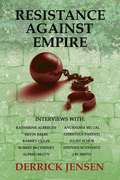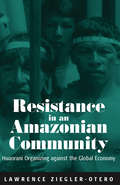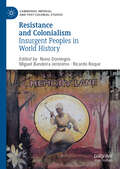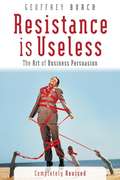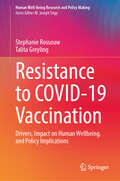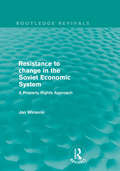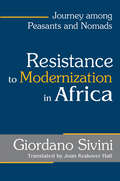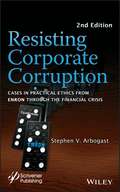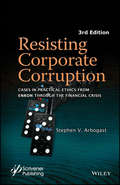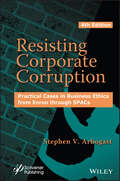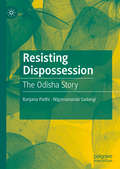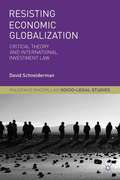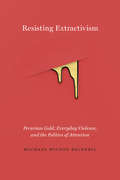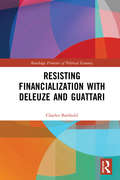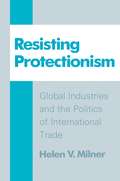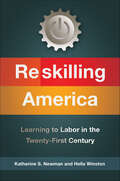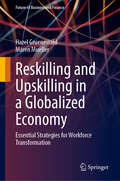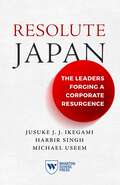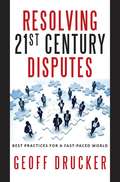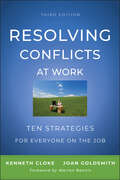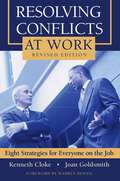- Table View
- List View
Resistance Against Empire
by Derrick JensenA scathing indictment of U. S. domestic and foreign policy, this collection of interviews gathers incendiary insights from 10 of today's most eperienced and knowledgeable activists. Whether it's Ramsey Clark describing the long history of military invasion, Alfred McCoy detailing the relationship between CIA activities and the increase in the global heroin trade, Stephen Schwartz reporting the obscene costs of nuclear armaments, or Katharine Albrecht tracing the horrors of the modern surveillance state, this investigation of global governance is sure to inform, engage, and incite readers. This book explores many of the consequences of empire and the methods it uses to enforce its license to extract and exploit. Anuradha Mittal describes the effects of colonialism and global trade on food security. Juliet Schor, Katherine Albrecht, and Christian Parenti discuss some of the mechanisms of repression on the home front, as citizens at its center are overworked, surveilled, and imprisoned. J.W. Smith explains how empire begins in the monopolization of land and ends in a global economy based on total control. These voices, together with the others in this book, comprise a strong indictment against the empire that holds our planet hostage to its ruthless appetite.
Resistance In An Amazonian Community
by Lawrence Ziegler-OteroLike many other indigenous groups, the Huaorani of eastern Ecuador are facing many challenges as they attempt to confront the globalization of capitalism in the 21st century. In 1991, they formed a political organization as a direct response to the growing threat to Huaorani territory posed by oil exploitation, colonization, and other pressures. The author explores the structures and practices of the organization, as well as the contradictions created by the imposition of an alien and hierarchical organizational form on a traditionally egalitarian society. This study has broad implications for those who work toward "cultural survival" or try to "save the rainforest."
Resistance and Colonialism: Insurgent Peoples in World History (Cambridge Imperial and Post-Colonial Studies Series)
by Ricardo Roque Miguel Bandeira Jerónimo Nuno DomingosThis volume offers a critical re-examination of colonial and anti-colonial resistance imageries and practices in imperial history. It offers a fresh critique of both pejorative and celebratory readings of ‘insurgent peoples’, and it seeks to revitalize the study of ‘resistance’ as an analytical field in the comparative history of Western colonialisms. It explores how to read and (de)code these issues in archival documents – and how to conjugate documental approaches with oral history, indigenous memories, and international histories of empire. The topics explored include runaway slaves and slave rebellions, mutiny and banditry, memories and practices of guerrilla and liberation, diplomatic negotiations and cross-border confrontations, theft, collaboration, and even the subversive effects of nature in colonial projects of labor exploitation.
Resistance is Useless: The Art of Business Persuasion
by Geoff BurchThis book will show you how anyone can be persuaded to do anything. Geoff Burch has written a book that will change almost everything you ever believed about business and selling. Combining the quick wit of a stand up comedian with the serious thoughtfulness of a psychoanalyst, he explains the value and power of persuasion - a verbal martial art that, if used correctly will always give you the outcome you desire in your business dealings. Resistance is Useless will show you how to: * Change anyone's opinion on any subject. * Transform a lynch mob into your most devout supporters. * Avoid wasting thousands of pounds on customer care while your accounts department is threatening to pulp your customer's fingers with a hammer. * Understand how a perfect product demonstration can get you hurled into the street by security. * Sell tanks to Genghis khan. Readership: General Business, customer service and sales.
Resistance to COVID-19 Vaccination: Drivers, Impact on Human Wellbeing, and Policy Implications (Human Well-Being Research and Policy Making)
by Stephanie Rossouw Talita GreylingThis book presents advanced methodologies for analyzing attitudes towards the COVID-19 vaccine across 10 countries spanning both the Northern and Southern hemispheres, employing cutting-edge Big Data and Fourth Industrial Revolution (4IR) techniques. Serving as an important resource for policymakers, it addresses attitudes towards and causes of growing vaccine hesitancy —a pressing concern identified by the World Health Organization as a top 10 global health threat. Moreover, the book sheds light on key factors associated with positive vaccine attitudes, aiming to bolster vaccine uptake rates. The authors explore the role of happiness in shaping health-related decision-making, offering actionable policy recommendations for governments. By sharing best-case practices, they equip policymakers and health officials worldwide with the necessary strategies to address future pandemics effectively.
Resistance to Change in the Soviet Economic System: A property rights approach (Routledge Revivals)
by Jan WinieckiFirst published in 1991, this book uses a property rights perspective to analyse why there is such widespread resistance to change in the Soviet Economic System. Many within the ruling stratum benefit considerably from their positions, particularly in terms of access to goods and services. In an original conclusion Jan Winiecki argues that a cost-effective way of removing the resistance of the parasitic ruling stratum would be a system of compensatory payments.
Resistance to Innovation
by Shaul Oreg Jacob GoldenbergEvery year, about 25,000 new products are introduced in the United States. Most of these products fail--at considerable expense to the companies that produce them. Such failures are typically thought to result from consumers' resistance to innovation, but marketers have tended to focus instead on consumers who show little resistance, despite these "early adopters" comprising only 20 percent of the consumer population. Shaul Oreg and Jacob Goldenberg bring the insights of marketing and organizational behavior to bear on the attitudes and behaviors of the remaining 80 percent who resist innovation. The authors identify two competing definitions of resistance: In marketing, resistance denotes a reluctance to adopt a worthy new product, or one that offers a clear benefit and carries little or no risk. In the field of organizational behavior, employees are defined as resistant if they are unwilling to implement changes regardless of the reasons behind their reluctance. Seeking to clarify the act of rejecting a new product from the reasons--rational or not--consumers may have for doing so, Oreg and Goldenberg propose a more coherent definition of resistance less encumbered by subjective, context-specific factors and personality traits. The application of this tighter definition makes it possible to disentangle resistance from its sources and ultimately offers a richer understanding of consumers' underlying motivations. This important research is made clear through the use of many real-life examples.
Resistance to Modernization in Africa: Journey Among Peasants and Nomads
by Giordano Sivini Joan Krakover HallGiordano Sivini has been an international aid consultant for over twenty-five years. Here he channels a 1960s and 1970s idealistic political commitment into fieldwork and the sphere of development from the 1980s to the present. Sivini writes with both passion and cynicism about his experiences with the numerous African aid projects he has been involved with over the years.While the fathers of independence of British and French decolonization wanted to change the colonial conditions of exploitation, Sivini finds that their good intentions have been shipwrecked. Ironically, the longer Sivini served as an aid consultant, the more he found himself dismayed at the various projects that were under way or slated to begin. He perceived some of the projects as grotesque, and, almost all ineffective. The money was wasted on such ventures not because of a particular government's interest in the social effects they would have on the local populace, but because of the direct and indirect benefits the government would receive.Sivini sees international development aid as its own market: development is a commodity that takes the form of large and small projects, and is traded for loans and gifts to generate political and economic advantages for the institutional participants in the exchange. Ultimately, governmental and aid projects often stimulate resistance from the local populace as agencies upset their usual system of production by regimenting peasants to produce for the market, then appropriate the cattle of nomadic pastoralists, villagizing and resettling peasants in areas of high productivity, and exploiting laborers in large farms. This creates social disintegration, mass migration in urban informal economy, and poverty.This is a dynamic and moving analysis of foreign aid that will be of interest to students of African studies, governmental programs, rural development, and political economy.
Resisting Brazil's Military Regime: An Account of the Battles of Sobral Pinto
by John W. F. DullesPraised by his many admirers as a "courageous and fearless" defender of human rights, Heráclito Fontoura Sobral Pinto (1893-1991) was the most consistently forceful opponent of the regime of Brazilian dictator Getúlio Vargas. John W. F. Dulles chronicled Sobral's battles with the Vargas government in Sobral Pinto, "The Conscience of Brazil": Leading the Attack against Vargas (1930-1945), which History: Reviews of New Books called "a must-read for anyone wanting to understand twentieth-century Brazil. " In this second and final volume of his biography of Sobral Pinto, Professor Dulles completes the story of the fiery crusader's fight for democracy, morality, and justice, particularly for the downtrodden. Drawing on Sobral's vast correspondence, Dulles offers an extensive account of Sobral's opposition to the military regime that ruled Brazil from 1964 to 1985. He describes how Sobral Pinto defended those who had been politically influential before April, 1964, as well as other victims of the regime, including Communists, once-powerful labor leaders, priests, militant journalists, and students. Because Sobral Pinto participated in so many of the struggles against the military regime, his experiences provide vivid new insights into this important period in recent Brazilian history. They also shed light on developments in the Catholic Church (Sobral, a devout Catholic, vigorously opposed liberation theology), as well as on Sobral's key role in preserving Brazil's commission for defending human rights.
Resisting Corporate Corruption
by Stephen V. ArbogastTaking a unique approach to business ethics unlike the typical focus on conceptual/legal frameworks, this book features 25 case studies that cover a full range of business practices, controls, and ethics issues. The new edition is fully updated with new case studies from the recent financial crisis, comparing it with Enron's crossing of various ethical lines. Interpretive essays explore financial control systems and lessons learned from specific case studies and circumstances. Readers will find a practical toolkit they can use to identify ethics issues and tackle problems effectively within corporations.
Resisting Corporate Corruption: Cases in Practical Ethics From Enron Through The Financial Crisis
by Stephen V. ArbogastResisting Corporate Corruption teaches business ethics in a manner very different from the philosophical and legal frameworks that dominate graduate schools. The book offers twenty-eight case studies and nine essays that cover a full range of business practice, controls and ethics issues. The essays discuss the nature of sound financial controls, root causes of the Financial Crisis, and the evolving nature of whistleblower protections. The cases are framed to instruct students in early identification of ethics problems and how to work such issues within corporate organizations. They also provide would-be whistleblowers with instruction on the challenges they’d face, plus information on the legal protections, and outside supports available should they embark on that course. Some of the cases illustrate how ‘The Young are the Most Vulnerable,’ i.e. short service employees are most at risk of being sacrificed by an unethical firm. Other cases show the ethical dilemmas facing well-known CEOs and the alternatives they can employ to better combine ethical conduct and sound business strategy. Through these case studies, students should emerge with a practical toolkit that better enables them to follow their moral compass. Finally, the cases provide an in depth look at how a corporation becomes progressively corrupted (Enron), how the Financial Crisis was rooted in ethical decay at institutions as diverse as Countrywide, Goldman Sacks, Citigroup, Fannie Mae and Moody’s, and at the ethical challenges that persist in the post-Crisis, post-Dodd-Frank environment.
Resisting Corporate Corruption: Practical Cases in Business Ethics from Enron through SPACs
by Stephen V. ArbogastResisting Corporate Corruption The frequently used textbook is now in its 4th edition and includes new case studies on Tesla, VW, Nikola, WeWork, and Theranos. Resisting Corporate Corruption teaches business ethics in a manner very different from the philosophical and legal frameworks that dominate graduate schools. The book offers twenty-seven case studies and eight essays that cover a full range of business practices, controls, and ethics issues. The essays discuss the nature of sound financial controls, root causes of the Financial Crisis, contemporary ethics challenges like ‘Fake it Till You Make It,’ and the evolving nature of whistleblower protections. The cases are framed to instruct students in early identification of ethics problems and how to work such issues within corporate organizations. They also provide would-be whistleblowers with instruction on the challenges they’d face, plus information on the legal protections, and outside supports available should they embark on that course. Some of the cases illustrate how ‘The Young are the Most Vulnerable,’ i.e. short-service employees are most at risk of being sacrificed by an unethical firm. Other cases show the ethical dilemmas facing well-known CEOs and the alternatives they can employ to better combine ethical conduct and sound business strategy. Through these case studies, students should emerge with a practical toolkit that will help them to follow their moral compass. Finally, the cases provide an in-depth look at how a corporation becomes progressively corrupted (Enron), how the Financial Crisis was rooted in ethical decay at institutions as diverse as Countrywide, Goldman Sacks, Citigroup, and Moody’s, and at the ethical challenges that have emerged in the post-crisis, post-Dodd-Frank environment at firms like TESLA, VW, Theranos and WeWork. Audience This text provides practical case study work for business and law students, and employees in the formative stages of their careers. It is intended to help prepare this audience to withstand pressures and adverse cultural influences as they progress along a career path.
Resisting Dispossession: The Odisha Story
by Ranjana Padhi Nigamananda SadangiThe book brings to the reader a set of political and social narratives woven around people’s resistance against big dams, mining and industrial projects, in short, displacement and dispossession in Odisha, India. This saga of dispossession abounds with stories and narratives of ordinary peasants, forest dwellers, fisher folk and landless wage laborers, which make the canvas of resistance history more complete. The book foregrounds these protagonists and the events that marked their lives; they live in the coastal plains as well as the hilly and forested areas of south and south-west Odisha.The authors have chronicled the development trajectory from the construction of the Hirakud Dam in the 1950s to the entry of corporations like POSCO and Vedanta in contemporary times. It thus covers extensive ground in interrogating the nature of industrialization being ushered into the state from post-independent India till today. The book depicts how and why people resist the development juggernaut in a state marked with endemic poverty. In unraveling this complex reality, the book conveys the world view of a vast section of people whose lives and livelihoods are tied up to land, forests, mountains, seas, rivers, lakes, ponds, trees, vines and bushes. These narratives fill a yawning gap in resistance literature in the context of Odisha. In doing so, they resonate with the current predicament of people in other mineral-rich states in Eastern India. The book is an endeavour to bring Odisha on the map of resistance politics and social movements in India and across the world.
Resisting Economic Globalization: Critical Theory and International Investment Law (Palgrave Socio-Legal Studies)
by David SchneidermanResisting Economic Globalization explores the magnitude of the legal constraints imposed by these rules and institutions associated with the worldwide spread of neoliberalism. Much contemporary theorizing has given up on national states as a locus for countering the harmful effects of economic globalization. Though states provide critical supports to the construction and ongoing maintenance of transnational legal constraints, David Schneiderman argues that states remain crucial sites for resisting, even rolling back, investment law disciplines. Structured as a series of encounters with selected critical theorists, the book contrasts theoretical diagnoses with recent episodes of resistance impeding investment law edicts. This novel approach tests contemporary hypotheses offered by leading political and legal theorists about the nature of power and the role of states and social movements in facilitating and undoing neoliberalism's legal edifices. As a consequence, the foundations of transnational legality become more apparent and the mechanisms for change more transparent.
Resisting Extractivism: Peruvian Gold, Everyday Violence, and the Politics of Attention
by Michael Wilson BecerrilPeru is classified as one of the deadliest countries in the world for environmental defenders, where activists face many forms of violence. Through an ethnographic and systematic comparison of four gold-mining conflicts in Peru, Resisting Extractivism presents a vivid account of subtle and routine forms of violence, analyzing how meaning-making practices render certain types of damage and suffering noticeable while occluding others. The book thus builds a theory of violence from the ground up—how it is framed, how it impacts people&’s lived experiences, and how it can be confronted. By excavating how the everyday interactions that underlie conflicts are discursively concealed and highlighted, this study assists in the prevention and transformation of violence over resource extraction in Latin America. The book draws on a controlled, qualitative comparison of four case studies, extensive ethnographic research conducted over fourteen months of fieldwork, analysis of over nine hundred archives and documents, and unprecedented access to more than 250 semi-structured interviews with key actors across industry, the state, civil society, and the media. Michael Wilson Becerril identifies, traces, and compares these dynamics to explain how similar cases can lead to contrasting outcomes—insights that may be usefully applied in other contexts to save lives and build better futures.
Resisting Financialization with Deleuze and Guattari (Routledge Frontiers of Political Economy)
by Charles BartholdResisting Financialization with Deleuze and Guattari aims to provide a contribution in relation to three main areas: the understanding of contemporary capitalism and financialization from a critical perspective; the analysis of resistance to financialization; and the better understanding of the philosophy of Deleuze and Guattari. Using a critical perspective, this book is informed by a Marxian literature in political economy and the poststructuralist works of Deleuze and Guattari, and Foucault. Through this, the author argues that it is relevant to combine Marxism and poststructuralism so as to better understand financialization. The analysis of resistance to financialization also provides a reflection on social democracy and Occupy Wall Street as contrasting ways to resist capitalism. Finally, this book will contribute to the analysis of Deleuze and Guattari through an analysis of their reception within political philosophy. This book provides the intellectual tools needed by academics in order to articulate a critical and revolutionary interpretation of Deleuze and Guattari, as well as analyse their reception by political philosophy. It also offers these tools to a more general audience interested in political economy and capitalism.
Resisting Protectionism: Global Industries and the Politics of International Trade
by Helen V. MilnerWhy didn't the protectionist spiral of the 1920s reappear in the 1970s in light of similar economic and political realities? In Resisting Protectionism, Helen Milner analyzes the growth of international economic interdependence and its effects on trade policy in the United States and France. She argues that the limited protectionist response of the 1970s stems from the growth of firms' international economic ties, which reduces their interest in protection by increasing its cost. Thus firms with greater international connections will be less protectionist than more domestically oriented firms. The book develops this thesis by examining the international ties of export dependence, multinationality, and global intra-firm trade. After studying selected U.S. industries, Milner also examines French firms to see if they respond to increased interdependence in the same way as American firms, despite their different historical, ideological, and political contexts.
Reskilling America: Learning to Labor in the Twenty-First Century
by Katherine S. Newman Hella WinstonFrom Katherine Newman, award-winning author of No Shame in My Game, and sociologist Hella Winston, a sharp and irrefutable call to reenergize this nation's long-neglected system of vocational trainingAfter decades of off-shoring and downsizing that have left blue collar workers obsolete and stranded, the United States is now on the verge of an industrial renaissance. Companies like Apple, BMW, Bosch, and Volkswagen are all opening plants and committing millions of dollars to build products right here on American soil. The only problem: we don't have a skilled enough labor pool to fill these positions, which are in many cases technically demanding and require specialized skills. A decades-long series of idealistic educational policies with the expressed goal of getting every student to go to college has left a generation of potential workers out of the system. Touted as a progressive, egalitarian institution providing opportunity even to those with the greatest need, the American secondary school system has in fact deepened existing inequalities, leaving behind millions of youth, especially those who live in the de-industrialized Northeast and Midwest, without much of a future at all. We can do better, argue acclaimed sociologists Katherine Newman and Hella Winston. Taking a page from the successful experience of countries like Germany and Austria, where youth unemployment is a mere 7%, they call for a radical reevaluation of the idea of vocational training, long discredited as an instrument of tracking. The United States can prepare a new, high-performance labor force if we revamp our school system to value industry apprenticeship and rigorous technical education. By doing so, we will not only be able to meet the growing demand for skilled employees in dozens of sectors where employers decry the absence of well trained workers -- we will make the American Dream accessible to all.
Reskilling and Upskilling in a Globalized Economy: Essential Strategies for Workforce Transformation (Future of Business and Finance)
by Hazel Gruenewald Maren MuellerThis book provides an in-depth exploration of upskilling and reskilling strategies, essential in today’s rapidly evolving and complex global landscape. The intensifying war for talent—driven by macro trends such as digitalization, AI, climate change, hybrid working, and demographic shifts—has made addressing the skills shortage a top priority for business leaders. These global challenges not only require organizations to proactively identify and integrate future skills through targeted training programs but also demand a shift toward socially just and ecologically sustainable practices. Grounded in cutting-edge research and proven practices, this book bridges the gap between theory and practice. It is an invaluable resource for HR professionals, business leaders, and educators dedicated to building a future-ready workforce.
Resocialising Europe in a Time of Crisis
by Nicola Countouris Mark FreedlandTerms such as 'Social Europe' and 'European Social Model' have long resided in the political and regulatory lexicon of European integration. But arguably, with the inclusion of a 'Solidarity' chapter in the Charter of Fundamental Rights, the EU social profile has entered a deep period of crisis. The ECJ judgments exemplify the unresolved tension between the EU's strong market imperatives and its fragile social aspirations while the ongoing economic crisis and the social conditions attached to 'bail out' packages are further indication of the continuing social retrenchment of social rights. The status quo is one in which workers appear to shoulder most of the risks attendant on making and executing arrangements for the doing of work. Chapters in this book advocate a reversal of this trend in favour of fair mutualization, so as to disperse these risks and share them more equitably between employers, the state, and society at large.
Resolute Japan: The Leaders Forging a Corporate Resurgence
by Jusuke JJ Ikegami Harbir Singh Michael UseemDiscover how Japan’s new leadership model has transformed its top companies and created a new paradigm for business successIn Resolute Japan, Waseda University’s Jusuke J. J. Ikegami and the Wharton School’s Harbir Singh and Michael Useem reveal a new leadership model that has led Japan’s corporations to make a stunning comeback. In the process, they share what they have learned from interviews with more than 100 CEOs and top executives of Japan’s largest and most influential companies, including Hitachi, Honda, Mitsubishi, Nissan, NTT, and Panasonic.In this book, you will discover:+ How Japan’s new leadership model has led to superior performance in the stock market and beyond;+ The core principles and practices that characterize Japan’s new leadership model and how they differ from the old models;+ How Japan’s new leadership model enables companies to balance multiple and often conflicting objectives, such as shareholder value and social responsibility, short-term results and long-term growth, and agility and stability;+ How Japan’s new leadership model fosters innovation, resilience, and competitiveness in a rapidly changing global environment;+ Why, even in an environment of macroeconomic stagnation due to economic policies at the national level, individual companies can achieve sustainable development through this new leadership model; and+ How Japan’s new leadership model can inspire and inform business leaders in the West and elsewhere who are facing similar challenges and opportunities.Resolute Japan offers a rare and insightful perspective on the new corporate fabric of Japan, one that is sure to both challenge and enlighten leaders around the world.
Resolving 21st Century Disputes
by Geoff DruckerWhy do people dig in their heels and adamantly refuse to admit they're wrong, even when the evidence is clearly against them? Why do people devote far more resources to fighting a battle than they can possibly recover, even if they win?How can both parties to a dispute be so certain of winning?Why do people resist changes that will make them better off? Who do people act contrary to their own beliefs? Why do people often find it so hard to figure out what they want? The answer to all these questions is that our minds are out of date. They evolved to resolve disputes among inhabitants of simple, stable, and homogeneous communities. The complex, diverse, and dynamic society we live in presents challenges that the mental tools we inherited from our ancestors are ill prepared to handle.You can learn how to overcome these challenges. Step one is learning to recognize when your mind is steering you in the wrong direction. Step two is learning how to get yourself back on track--and help others do the same.
Resolving Community Conflicts and Problems: Public Deliberation and Sustained Dialogue
by Roger Lohmann Jon Van TilPublic deliberation and group discussion can strengthen the foundations of civil society, even when the groups engaged in debate share a history of animosity. Scholars have begun to study the dialogue sustaining these conversations, especially its power to unite and divide groups and individuals. The twenty-four essays in this collection analyze public exchanges and the nature of sustained dialogue within the context of race relations, social justice, ethnic conflicts, public-safety issues, public management, community design, and family therapy. They particularly focus on college campuses and the networks of organizations and actors that have found success there. Open discussion may seem like an idealistic if not foolhardy gesture in such milieus, yet in fact the practice proves crucial to establishing and reinforcing civic harmony.
Resolving Conflicts at Work
by Joan Goldsmith Kenneth ClokeThe classic text on resolving workplace conflicts, fully revised and updatedResolving Conflicts at Work is a guide for preventing and resolving conflicts, miscommunications, and misunderstandings at work, including dozens of techniques for revealing how the inevitable disputes and divisions in the workplace are actually opportunities for greater creativity, productivity, enhanced morale, and personal growth. In the third edition of this text, all chapters are completely infused with additional content, updated examples, and new case studies. Like its predecessors, it identifies core strategies for preventing and resolving both intermittent and chronic conflicts in the workplace. In addition, the bookIncludes a new foreword by Warren Bennis, which represents his most recent thinking about judgment calls and candid communications in the workplacePresents new chapters on leadership and transformational conflict coaching, and organizational systems designThis definitive and comprehensive work provides a handy guide for managers, employees, union representatives, human resource experts, and consultants seeking to maintain stable and productive workplaces.
Resolving Conflicts at Work
by Warren Bennis Joan Goldsmith Kenneth ClokeHere is a completely updated edition of the best-selling Resolving Conflicts at Work. This definitive and comprehensive work provides a handy guide for resolving conflicts, miscommunications, and misunderstandings at work and outlines the authors' eight strategies that show how the inevitable disputes and divisions in the workplace actually provide an opportunity for greater creativity, productivity, enhanced morale, and personal growth. This new edition includes current case studies that put the focus on leadership, management, and how organizations can design systems to change a culture of avoidance into a culture of creative conflict. The result is a more practical book for today's companies and the people who work in them.
